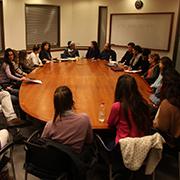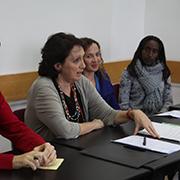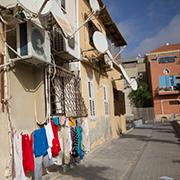Workers' Rights Clinic
In November 2024, the Clinic achieved a landmark legal victory in the struggle against the privatization of social services in Israel. In a petition jointly managed with the Koach LaOvdim labor organization, the Jerusalem Administrative Court accepted the Clinic’s petition against the Ministry of Welfare and cancelled the tender for operating residential homes for at-risk youth!
As a result, a deficit-based tender was halted, the deterioration of counselors' wages back to minimum wage was prevented, the budget-per-occupancy method (which would have led to mass layoffs due to underfunding) was disqualified, and age-based discrimination in bonuses granted only to younger workers was averted.
Additionally, following the petition, the Court ruled that the Ministry of Welfare is obligated to resolve the severe staffing crisis in these services (with an average employment duration of only 10 months!), to retain existing staff, and to provide them with job security and fair wages.
Between October 2022 and June 2023, students from the Workers’ Rights Clinic, under the guidance of Attorney Michal Tadjer, Prof. Hila Shamir, and Prof. Guy Mundlak, examined how language accessibility and translation are handled in labor court proceedings. Based on extensive fieldwork, the Clinic team produced a comprehensive report containing findings and recommendations for improving the situation. The bottom line: the system fails to provide access to justice for non-Hebrew-speaking parties.
The overall picture raises concerns that the lack of regulation and guidance—as well as failure to implement essential tender components—causes severe and structural harm to the feasibility of a fair and translated legal process.
To read the full report – see the following link
The Clinic participated in representing a constitutional petition filed on behalf of two migrant workers and two human rights organizations, demanding the cancellation of a clause in the Foreign Workers Law that permits the forfeiture of pension and severance funds from migrant workers who do not leave Israel at the end of their visa. HCJ 6942/19 Chibanu v. Minister of Interior – a ruling is pending before an expanded panel of seven justices.
The Clinic is representing seven undocumented cleaning workers who were recognized as victims of human trafficking due to fraudulent recruitment, exploitative working conditions, and sexual abuse committed during their employment. The workers filed claims against both their direct employers and the public institutions where they were assigned. The case exposed a chain of subcontracting that facilitates exploitation, and the litigation has produced policy documents aimed at preempting similar cases. The cases are confidential and under a gag order.
The Clinic has been involved in identifying victims of human trafficking and addressing their representation and protection in courts, particularly in the agriculture, construction, and cleaning sectors. In 2023, the Clinic represented 14 trafficking victims residing in shelters, in legal proceedings regarding their labor rights and/or legal status and witness protection. These cases are confidential due to ongoing investigations.
The Clinic participated in representing Kav LaOved in a petition to the High Court demanding the cancellation (or drastic revision) of the Foreign Trainee Programs in Agriculture, under which thousands of students from developing countries arrive each year for so-called "training" but are actually employed in full-time agricultural work. HCJ 3717/21 Kav LaOved v. Ministry of Foreign Affairs et al.
The Clinic was involved in representing a group of human rights organizations demanding that legal aid be provided to non-citizens by the Legal Aid Division of the Ministry of Justice. The petition argued that the Legal Aid Law does not exclude non-citizens based on their status and that the only criterion for assistance is economic eligibility. It claimed that the decision of the head of the Legal Aid Division to deny representation to non-citizens was ultra vires (beyond legal authority). HCJ 5012/22 The Association for Civil Rights in Israel et al. v. Minister of Justice et al.
Following an administrative petition filed by the Clinic, along with the Criminal Justice Clinic, the hourly wage of prisoners working in private factories operating within Israeli prisons, was raised by 38%.
A motion submitted by the Clinic led to the annulment of COVID-19 emergency regulations that would have furloughed thousands of pregnant female workers.
The Clinic filed a precedent-setting petition against the employment arrangement of caregivers working in Ministry of Labor supervised pre-nursery daycares in Israel. The petition claims that the caregivers’ employment arrangement is unconstitutional, as it infringes on their human dignity by stipulating a remuneration lower than the minimum wage.
Following the dismissal of a school teacher undergoing a sex reassignment process, the Clinic filed an urgent request for provisional relief to the Labor Court against the Ministry of Education, demanding it cease from dismissing the teacher and immediately return him to his position at the school. Soon after the Clinic’s appeal to the court, the Ministry of Education agreed to all of our demands.
Assistance to the first sex workers’ organization in Israel – Argaman – Organization of Working Women - in its establishment and registration process.
A lawsuit filed by the Clinic on behalf of a female worker who was discriminated against in admittance to a job due to her pregnancy, ended in a settlement agreement in the amount of ILS 50,000.
As part of TraffLab research project, the Clinic filed a lawsuit for a total of ILS 1,800,000, on behalf of five Turkish construction workers who were employed by a Turkish company under extremely exploitative working conditions. The employees reported that they were denied breaks/rest days; were locked in the compound, and were threatened and beaten if found outside; there was little regard for safety measures; and living conditions were crowded and inadequate. The lawsuit includes a compensation claim for violations of Israeli labor laws; and, it attempts to establish which conditions define exploitive employment practices that lead to trafficking and slavery. If successful, it will set a precedent that can standardize and improve working conditions in similar situations.
As part of a project to advance employment opportunities for residents of Jisr az-Zarqa, dozens of lectures on workers' rights were delivered by the Clinic to local high school students, adult residents and civil society representatives living and working in the village.
A bill promoted by the Clinic led to a change in the statute of limitations for convalescence pay.
A precedent-setting ruling was handed-down in a case filed by the Clinic against the Histadrut, following the organization’s attempt to exclude “Koach LaOvdim” Democratic Labor Organization from representing the academic personnel of the Open University.
Following a lawsuit filed by the Clinic, the Labor Court ruled against the practice of firing employees every 9 months in order to deprive them of social rights.





